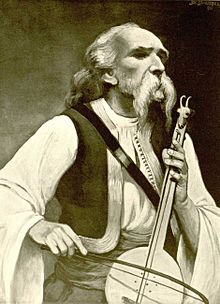Filip Višnjić
| Filip Višnjić | |
|---|---|
 |
|
| Born | Gornja Trnova, Ottoman Empire |
| Died | Grk, Austrian Empire |
| Known for | Serbian epic poetry |
Filip Višnjić (pronounced [fîliːp ʋîʃɲit͡ɕ], Serbian Cyrillic: Филип Вишњић; 1767–1834) was a popular Serbian epic poet and guslar (gusle player), born in northern Bosnia. He is often described as the "Serbian Homer" both because he was blind and for his poetic gift. Living in a time of exceptional significance for Serbian history, the bard composed poems about these events, and they became a highly valued part of the Serbian epic poetry. Vuk Karadžić considered him the best ballad writer and singer of his time.
He was born at Vilića Guvno in Gornja Trnova near Ugljevik, in the Eyalet of Bosnia of the Ottoman Empire (today in Bosnia and Herzegovina), and died in the village of Grk (later renamed Višnjićevo after him) near Šid, Serbia (then part of the Austrian Empire). Filip Višnjić's true surname was Vilić. According to some authors, he was called Višnjić either after his mother’s name Višnja, or after the Višnjica quarter of Međaši, where he lived until he moved to Serbia.
He lived in Gornja Trnova until three years of age, when Ottoman Turks destroyed his family. His mother remarried into the Mirkanović family and moved to the village of Međaši in the lowlands of Semberija, taking little Filip with her. There he learned to play the Serbian epic poets' beloved string instrument gusle, and composed his first verses. He would often play on the archaic gusle at the church in Brodac. Blind from early childhood, unable to earn for living otherwise, he sang the traditional epic songs and composed many by himself.
...
Wikipedia
